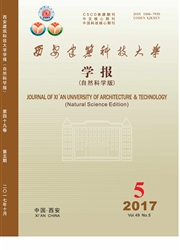

 中文摘要:
中文摘要:
建筑能耗预测模型是进行建筑节能设计及节能改造的有力工具,而建筑能耗分析是建立建筑能耗预测模型的基础.本文建立了重庆地区的空调办公建筑模型,采用Energy Plus软件模拟分析了该城市建筑各设计参数对暖通空调系统及建筑年总能耗的影响,选取对建筑能耗影响较大的9项设计参数,建立了重庆地区暖通空调系统及建筑年总能耗的预测回归模型,随机选取20组数据来评价预测回归模型的准确性.结果表明:各设计参数中窗墙比、设备功率密度、照明功率密度等对暖通空调系统及建筑年总能耗影响较大,重庆建筑暖通空调系统及年总能耗预测回归模型R^2分别为0.960和0.966,估计标准偏差都为1.122 W/m^2;能耗预测值与模拟值的最大偏差分别为-12.813%和-7.063%.
 英文摘要:
英文摘要:
Building energy consumption prediction model is a powerful tool for energy-saving design and reformation, and building energy analysis is the basis for the establishment of building energy consumption prediction model. In this paper, air-conditioned office building models was established in Chongqing. Impact of the city building design parameters on HVAC and building energy consumption was analyzed using the simulation tool Energy Plus. And it established Chongqing building HVAC and annual energy use predicted regression model using 9 design parameters which have a great impact on building energy consumption, then evaluated the predictive accuracy of the regression model with 20 sets of data which were selected randomly. The results showed that:Window to wall ratio, device power density, lighting power density and so on of all design parameters have greater impact on building energy consumption; R^2 of Chongqing building HVAC and annual energy predicted regression model were 0.960 and 0.966, estimated standard deviation both were 1.122 W/m^2; the maximum deviation building annual energy consumption predicted values and simulated values were-12.813% and-7.063%.
 同期刊论文项目
同期刊论文项目
 同项目期刊论文
同项目期刊论文
 期刊信息
期刊信息
